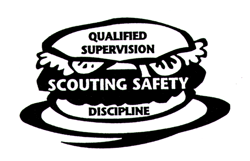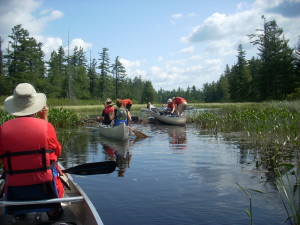Some unfortunate stories on the web might cause the reader to conclude that those acting as outdoor program supervisors (such as volunteer Scout leaders) were overconfident in their abilities, and overwhelmed by the circumstances with which they were confronted, leading to a tragic, or near tragic, end result.
However, it might alternatively also be concluded that they were merely ill-informed as to the skills required for the position they chose to accept, and lacked sufficient experience within the environment in which the activity occurred, to properly exercise the judgment required, to obtain the result desired.
So, whose duty is it to make sure that a well-meaning adult leader has acquired the knowledge and experience required to competently engage in an outdoor activity in a supervisory role with youth? Is it solely the adult leader’s, or does that duty extend further afield within the unit?
 Some adult leaders are placed into, or assume, supervisory positions in the outdoors without the leader taking the initiative to learn what they need to know prior to the activity, due to one or more of:
Some adult leaders are placed into, or assume, supervisory positions in the outdoors without the leader taking the initiative to learn what they need to know prior to the activity, due to one or more of:
- overconfidence (“Super Leader syndrome”),
- not realizing what they need to know,
- not being informed as to what they need to know,
- failing to understand what they need to know, or
- refusing to admit what they do not know.
The leader, of course, has a duty to (1) not only inquire as to what knowledge and experience is required to competently plan and conduct a particular activity, but also to (2) obtain such knowledge and experience to be as competent as possible (“qualified supervision”). But, an adult leader should not be expected to bear this burden alone.
 The unit also has a responsibility to ensure that this occurs, so that the leader does not “jump into the water” without sufficient warning of what they both need to know, and do, once they “enter the water”.
The unit also has a responsibility to ensure that this occurs, so that the leader does not “jump into the water” without sufficient warning of what they both need to know, and do, once they “enter the water”.
The unit indeed has an obligation to ensure that its adult leaders are sufficiently trained, and have acquired the necessary experience, to competently engage in the relevant activity as guardian for the unit’s youth.
Sort of a “trust but verify” scenario . . . trust the adult leader to act competently and exercise qualified supervision in the chosen activity, but verify that everything is in place to ensure that the desired result can occur!
Scout units should accordingly consider the providing of EXPERIENCE to, and the TRAINING of, its volunteer leaders to be a continual process which is an integral part of providing a competent outdoor program. This is particularly important given the degree of adult volunteer turnover which sometimes occurs within units. This will assist in ensuring that the duty of care toward the Scouts is met.
Be prepared!
